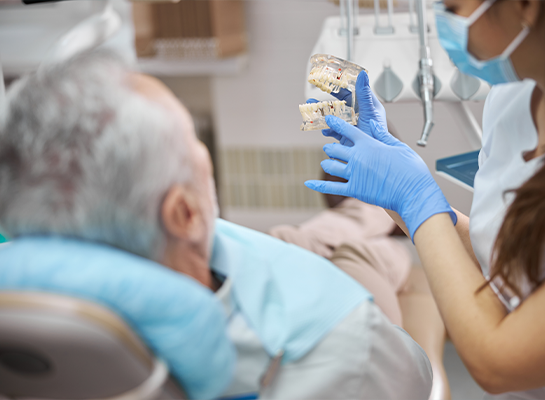Full Mouth Rehabilitation White Marsh
The Comprehensive Solution for Restoring Damaged Smiles

At Dental Designs of Maryland in White Marsh, our team of expert restorative dentists regularly sees patients with worn-down, damaged, and otherwise compromised teeth. To make those smiles whole, comfortable, and functional again, we offer custom-tailored full mouth rehabilitations, which utilize two or more of our many restorative and cosmetic treatments to create a smile that sparks confidence. To learn more about this process and whether or not you qualify, call our office today to schedule a consultation.
Why Choose Dental Designs of Maryland for Full Mouth Rehabilitation?
- Same-Day CEREC Dental Crowns Available
- Modern, State-of-the-Art Dental Office
- Team of Eight Knowledgeable Dentists
Who is a Good Candidate for Full Mouth Rehabilitation?

Are you interested in learning more about full mouth rehabilitation in White Marsh, but aren’t sure where to start? Typically, we recommend this service for patients dealing with the following aesthetic and dental issues:
- Slight dental misalignment or gapped teeth
- Damaged or decayed teeth
- Lingering dental issues that have gone left untreated
- Missing one or more teeth
- Low confidence due to aesthetic dental flaws like tooth discoloration
We often see patients who are suffering from one or several of the issues above for full mouth rehabilitation, as it involves a comprehensive examination of not only the health and function of the teeth, but also their aesthetic.
The Full Mouth Rehabilitation Process

The full mouth rehabilitation process in White Marsh starts with an in-depth consultation with one of our phenomenal restorative dentists. This will include a visual examination of your teeth and gums, as well as the review of any necessary X-rays. Your dentist will also take the time to speak with you about your smile goals, whether you have a specific timeline in mind to complete the process by, and your medical and dental health history. Then, based on findings during your consultation, your dentist may recommend two or more of the following services:
- Veneers
- Metal-free dental restorations
- Teeth whitening
- Dental bonding
- CEREC same-day dental crowns
- White fillings or porcelain onlays
- Root canal treatment
- Dentures and bridges
- Tooth extraction
- Dental implants
- Aesthetic injectables
Once our team has discussed your treatment plan with you, we’ll be happy to answer any questions you may have regarding our recommendations, pricing, scheduling, and any concerns.
Understanding the Cost of Full Mouth Rehabilitation

Before you commit to moving forward with our team’s recommended full mouth rehabilitation treatment plan, our front desk staff will provide you with a detailed cost estimate of your procedures so you know exactly what to expect when it comes time to pay for your services. While we’re happy to file dental insurance claims on your behalf for appropriate services, we also offer additional financing through CareCredit to split the overall cost of your treatment into easy-to-manage monthly payments. And as always, if you have any questions or concerns, please let us know! We’re always happy to help!
Full Mouth Rehabilitation FAQs
How Long Does a Full Mouth Rehabilitation Take?
Since the full mouth rehabilitation process is highly customizable, the timeline for completing it isn’t set in stone. There are several factors that can affect the overall length of the process, such as:
- The number of teeth involved.
- The specific services that make up you full mouth rehabilitation plan.
- Whether the services you need can be completed at the same time or must be done one after another.
Once we have examined your mouth and learned more about your needs, we can give you an idea of how long you can expect your full mouth rehabilitation to take. Please let us know if there’s a specific upcoming event that you want to prepare your smile for; we can take that into account when putting together your rehabilitation plan.
Does Getting a Full Mouth Rehabilitation Hurt?
Your comfort will always be a top priority regardless of what treatments make up your full mouth rehabilitation process. For more complex procedures, a local anesthetic can be applied to your mouth in order to keep it numb while we’re working with your teeth and gums.
There might be some soreness after certain procedures. Our team will give you any necessary instructions for keeping discomfort under control while your mouth is recovering. Generally speaking, these instructions may include sticking to a diet of soft foods, staying away from hot drinks, and getting plenty of rest.
Can I Get a Full Mouth Rehabilitation If I Smoke?
The answer to this question can be different for each patient. Your dentist will need to consider your overall situation before deciding whether you’re a viable candidate for full mouth rehabilitation.
While it may still be possible to undergo the process even if you smoke, you will most likely be instructed to stay away from tobacco products for a while before and after certain procedures. Tobacco can have an adverse effect on the mouth’s healing capabilities, so it’s best avoided if you want to minimize the chances of a complication occurring.
Of course, it’s not unusual to have trouble giving up smoking even temporarily. Talk to your primary care physician to see what they suggest for breaking the habit so that you can have a full mouth rehabilitation performed.
How Do I Care for My Smile After Full Mouth Rehabilitation?
If you want to maintain your newly rehabilitated smile, then you will need to follow these important steps:
- Practice good oral hygiene habits. This means brushing two times a day, flossing once a day, and using mouthwash.
- Break any habits that might put your teeth at risk. Such habits can include crunching ice and tearing open packages with your teeth.
- Make time to visit your dentist at least once every six months. Regular checkups and cleanings are essential for keeping gum disease and tooth decay at bay.

